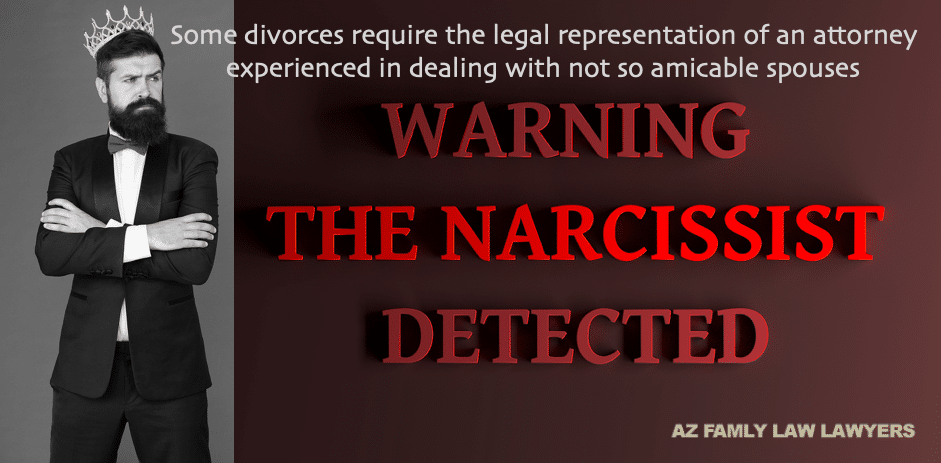Divorcing a Narcissist? What You Will Need to Know
What is a Narcissist?
 Narcissists typically display symptoms like an inflated sense of importance, a need for attention and praise, and a lack of empathy for others. Divorcing a spouse with narcissistic personality disorder can be particularly stressful. Narcissists will typically view a divorce as a “win/lose” situation. Narcissists may also be less likely to cooperate to successfully complete a mediation, forcing the divorce to go to trial.
Narcissists typically display symptoms like an inflated sense of importance, a need for attention and praise, and a lack of empathy for others. Divorcing a spouse with narcissistic personality disorder can be particularly stressful. Narcissists will typically view a divorce as a “win/lose” situation. Narcissists may also be less likely to cooperate to successfully complete a mediation, forcing the divorce to go to trial.
How Do I Know if I am Married to a Narcissist?
Unless your spouse has been diagnosed by a license professional as having narcissistic personality disorder, you can only make an educated guess as to your spouse’s narcissism. If you are seeing a counselor, they may be able to tell you if your spouse being a narcissist is a possibility. You should do self-research into the disorder if you suspect your spouse of narcissism.
Divorcing a Narcissist
 Whether your spouse has been diagnosed with narcissism, or if you only suspect they could be, you know you have a difficult path ahead if you want to file for divorce. Mediation may not be appropriate for your divorce, as the process isn’t designed for when at least one spouse is abusive- which narcissists usually are. Narcissists may file excessive motions during a divorce, possibly alleging abuse or child neglect, hiding assets, or infidelity. You may also expect lowball offers, dramatics in and out of the courtroom, and an overall attitude of being due for every wrong committed against them. You need to be prepared for a long and arduous litigation process.
Whether your spouse has been diagnosed with narcissism, or if you only suspect they could be, you know you have a difficult path ahead if you want to file for divorce. Mediation may not be appropriate for your divorce, as the process isn’t designed for when at least one spouse is abusive- which narcissists usually are. Narcissists may file excessive motions during a divorce, possibly alleging abuse or child neglect, hiding assets, or infidelity. You may also expect lowball offers, dramatics in and out of the courtroom, and an overall attitude of being due for every wrong committed against them. You need to be prepared for a long and arduous litigation process.
Tips for Divorcing a Narcissistic Person
- –Maintain boundaries. Don’t allow your spouse to interrupt you. Either, when it is your turn to speak at meditations and other negotiations, or during your parenting time. Thus, don’t immediately respond to your spouse’s communications. If you have a court order establishing standards of conduct between you and your spouse, strictly abide by and refer to the terms of the order. Keep contact as limited and unemotional as possible.
- –Take others’ advice with a giant of salt. Your friends and family members mean well when they give you advice about your divorce. However, their advice is likely tailored to someone who isn’t married to a person with narcissistic personality disorder.
- –Don’t defend yourself to your spouse, but defend yourself to children and other relatives. Your spouse will take defending yourself as an invitation to argue. Don’t justify yourself, just stick to the plain facts of the situation at hand. However, if your spouse has been telling your children blatant lies, you should unemotionally correct that with your side of the story.
- –Keep evidence of everything. Don’t expect your spouse to follow through with verbal promises during divorce proceedings. Any issue you settle should be done in writing. You should also have evidence about the formation of such agreements. Whenever possible, keep screenshots, make copies, etc. to back up your position in disagreements.
- –Hire an attorney. Some couples have an uncontested divorce and are able to proceed without attorney representation. Narcissists can be combative, manipulative, and portray themselves as victims, so it probably isn’t a good idea to proceed self-represented when divorcing one. However, if your spouse has an attorney, it is even more vital that you hire an attorney. Hiring an attorney evens the playing field.
- –Take care of yourself. Divorce is already a stressful enough process. Find a friend or counselor you can talk to. Try your best to exercise and live a healthy lifestyle. Do whatever you need to do to survive a divorce from a narcissist.It may be best for you to wait until the divorce is finalized to begin dating again.
If you suspect that you are married to a narcissist and want out, you need an expert family law attorney on your side. The first step towards navigating difficult custody and divorce issues with a manipulative spouse is to have a consultation with a family law attorney. The initial consultation is free and can be conducted over the phone. Our entire staff has experience dealing with all types of family law matters, amicable and otherwise. Call today to see what our attorneys can do for you.

Phoenix Location:
343 W Roosevelt St UNIT 100,
Phoenix, AZ 85003
Office: (480) 680-9126
Email: info@myazlawyers.com
Website: https://azfamilylawlawyer.com
Mesa Location:
1731 West Baseline Rd., Suite #101
Mesa, AZ 85202
Office: (480) 448-9800
Email: info@myazlawyers.com
Website: https://myazlawyers.com
Glendale Location:
20325 N 51st Avenue Suite #134, Building 5
Glendale, AZ 85308
Office: (602) 509-0955
Tucson Location:
2 East Congress St., Suite #900-6A
Tucson, AZ 85701
Office: (520) 441-1450
Avondale Location:
12725 W. Indian School Rd., Ste E, #101
Avondale, AZ 85392
Office: (623) 399-4222
Additional Information at:
Phoenix Bankruptcy Lawyer
Mesa Bankruptcy Lawyers
Phoenix DUI Lawyer
Chandler Bankruptcy Lawyer
Tempe Bankruptcy Lawyers
Vegas Zero Down Bankruptcy Attorney
Gilbert Bankruptcy Lawyers
Tucson Bankruptcy Lawyer
Arizona Zero Down DUI
Las Vegas Bankruptcy Lawyers
AZ Bankruptcy Lawyer


